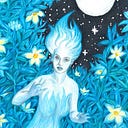I think that you need to define "god" first. Because depending on one's definition of "God", someone can indeed identify as an atheist and a theist at the same time.
For example. I have had nondualist experiences. Mystical experiences. Through these experiences I have come to feel that existence is non-dual, not separate. Including consciousness.
Do I believe in "God" as described by religious people, in the literal sense? No. Do I believe that some religious people use God as a metaphor for what I have experienced? Yes.
So depending on who I am talking to, and how they define "God", I will identify as an atheist or a pantheist. To a fundamentalist Catholic, I am an atheist. To a mystical or open minded Christian, I am a theist.
To a modern nationalist Hindu, I am an atheist. To a Hindu who believes in Advaita Vedanta, I am a Hindu.
Do I believe in Shiva as a humanoid being who wears a moon on his head and a snake around his neck? No. Do I believe in the principle of universal consciousness and "void" behind Shiva? Yes.
You see what I mean?
